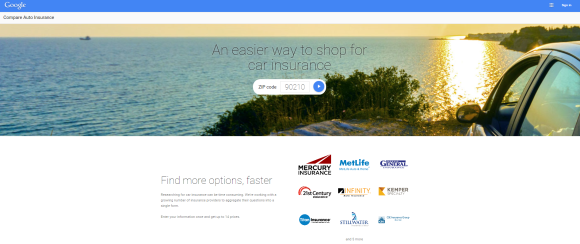The way Valen Analytics President and CEO Dax Craig describes it, Google’s move into insurance with Google Compare for auto insurance is an “all-aboard, wake-up-and-smell-the-coffee” call to the insurance industry.
His words were simpler: “Game changer.”
The complexity of what Google is doing with this latest endeavor, and figuring out where this partnership will go and how exactly it’s being structured, can’t be overstated.
Craig, whose Denver, Colo.-based firm partners with insurance carriers to improve underwriting performance with data, analytics and predictive modeling, was in the audience at Valen’s summit for executives in Vail, Colo. last week when Compare.com CEO Andrew Rose announced news of his firm’s partnership with Google to bring direct sales of auto insurance to California, and eventually the rest of the nation.
“The only thing that comes to mind is shock and awe,” Craig said. “I think everybody was floored.”
 Some sort of deal with the Mountain View, Calif.-based tech company and Compare.com had been rumored for more than a month, and Google’s plans for insurance have been talked about since the beginning of the year. However, the reality that Google has officially entered the insurance market could be seen dawning on the faces of many audience members pondering the ramifications, he said.
Some sort of deal with the Mountain View, Calif.-based tech company and Compare.com had been rumored for more than a month, and Google’s plans for insurance have been talked about since the beginning of the year. However, the reality that Google has officially entered the insurance market could be seen dawning on the faces of many audience members pondering the ramifications, he said.
“Everybody went silent to think about how that impacted them and what it meant for their business,” Craig said.
Google’s announcement that it was partnering with Compare.com and CoverHound, which made headlines last week, included the unveiling of an online comparison tool that includes a list of major carriers that have signed on as partners.
The tool enables auto insurance shoppers to punch in a ZIP code and hit enter, which brings up a form for basic information, like name and date of birth. The site also offers visitors a choice to “speed things up” via an autofill feature.
That ease-of-use from the world’s foremost internet search provider in partnership with a cadre of large carriers and comparison-providers may have broader implications for the future of insurance distribution.
Craig and others believe the ascending Google insurance-force won’t stop at offering auto insurance.
“I think that auto is the first, best place to start,” Craig said. “Homeowners and renters insurance will follow, small commercial will be after that. As companies learn how to do this better, to overcome the technical hurdles, they will apply it to every type of insurance.”
Keith Moore, CEO of CoverHound, which also offers homeowners, and motorcycle and renters insurance, was limited in what he could say about future plans in the Google partnership.
Yet, he didn’t deny the probability that Google Compare will expand beyond auto.
“Based on our partnership, I can’t speak on their behalf, but they will expand into other lines of insurance for sure,” he said.
San Francisco-based CoverHound is already beefing up for Google’s planned expansion into other states, and the company earlier this week announced it raised $14 million in Series B financing through existing and new investors, including the venture capital arm of American Family Insurance.
To date, CoverHound has raised more than $20 million in venture funding, and it has an impressive list of carrier partners including Progressive, Esurance, 21st Century, Safeco, Mercury, Travelers and The Hartford.
The new funding will support CoverHound’s carrier growth and integrations with large marketing partnerships like this one, Moore said.
The partnership with Compare.com will work by giving Google Compare users access to some of Compare.com’s 41 carrier partners through the Google Compare site. While Google is offering compare.com’s providers in addition to forming its own carrier panel, not all of compare.com’s carrier partners are available through the Google Compare site.
Also joining the rising Google Compare force is BOLT Solutions Inc., a property/casualty insurance distribution platform provider.
“Consumers have come to trust the Google brand and rely on its history of providing immediate access and keeping processes streamlined and simple,” Eric Gewirtzman, CEO of Bolt, said in a statement. “Google’s broad distribution reach makes it a natural fit, albeit a distribution channel that is quite different than to what our industry is accustomed. We see this move by Google as a tremendous opportunity for carriers to reach out and offer products to a wealth of buyers for which they may not otherwise have access.”
The number of entities partnering up leaves doors of possibility wide open, yet there’s little indication where Google Compare goes from here.
A Google spokesman said that aside from a press release it issued when the partnership was announced the company would not immediately comment.
Asked to provide any details on future plans for this story, Google spokesman Joe Osborne declined, replying to an email request for any elaboration with “we rarely make forward-looking statements about our products.”
Just how this partnership is geared to work isn’t exactly clear either, since Google has offered few details on it and most of what is known comes from individual partners in Google Compare.
Google is known for keeping a low profile with the press on its new endeavors. The company rarely has replied to requests for interviews on its autonomous vehicle development program, and before that Google said little about its Google Glass product.
Valen’s Craig believes that Google may still be working out some of those details.
In his view, as Google Compare grows, Google will make changes, adapt, add and subtract partners and services, and fix anything that needs fixing.
“They are very much test and learn,” Craig said of Google.
The way Moore explained the partnership is that when consumers use Google Compare they receive a quote and can deal directly with carrier partners like Mercury Insurance, MetLife, The General Insurance and Infinity Auto Insurance.
But consumers may click on CoverHound from the Google site, or get a phone number from their search and call in to CoverHound’s call center, and then CoverHound will match them up with one of its carrier partners.
The idea is that consumers quickly see a rate for auto insurance, then they can click on it and purchase auto insurance.
“We’re all about the comparison shopping process,” Moore said.
Seamless and easy may not be how the insurance industry will eventually react to Google’s entry into the insurance market.
“It remains to be seen how the insurance industry’s going to react to it,” Craig said. “The industry is ripe for disruption. The same old ways of doing business don’t work as well as they use to. The insurance industry, in my opinion, has opened itself up to vulnerability to tech-savvy companies like Google.”
It’s an interesting conundrum for carriers and it’s a matter for agents to deal with too, he said.
There’s no shortage of distribution experts that have over the past several years called for an evolution in the way carriers and agents tackle distribution and solicit customers.
Some point out that the biggest up-and-coming consumer force is the millennial generation, which prefers an online experience over phone calls. Studies show 71 percent of consumers conduct research on the internet before purchasing insurance, and more than 40 million insurance quotes were given online in 2013.
“I think agents will have to adapt to the modern way of doing business or they stand a chance to become irrelevant to the modern consumer experience,” Craig said. “When you think about it millennials really are the future, and they’re about to become the largest consumer demographic, so that Google announcement is truly game changing.”
See related stories:
Was this article valuable?
Here are more articles you may enjoy.


 Charges Dropped Against ‘Poster Boy’ Florida Contractor Accused of Insurance Fraud
Charges Dropped Against ‘Poster Boy’ Florida Contractor Accused of Insurance Fraud  MAPFRE Denied Injunction Against AAA Auto Insurance Sales in Massachusetts
MAPFRE Denied Injunction Against AAA Auto Insurance Sales in Massachusetts  The $3 Trillion AI Data Center Build-Out Becomes All-Consuming for Debt Markets
The $3 Trillion AI Data Center Build-Out Becomes All-Consuming for Debt Markets  Howden-Driven Talent War Has Cost Brown & Brown $23M in Revenue, CEO Says
Howden-Driven Talent War Has Cost Brown & Brown $23M in Revenue, CEO Says 

